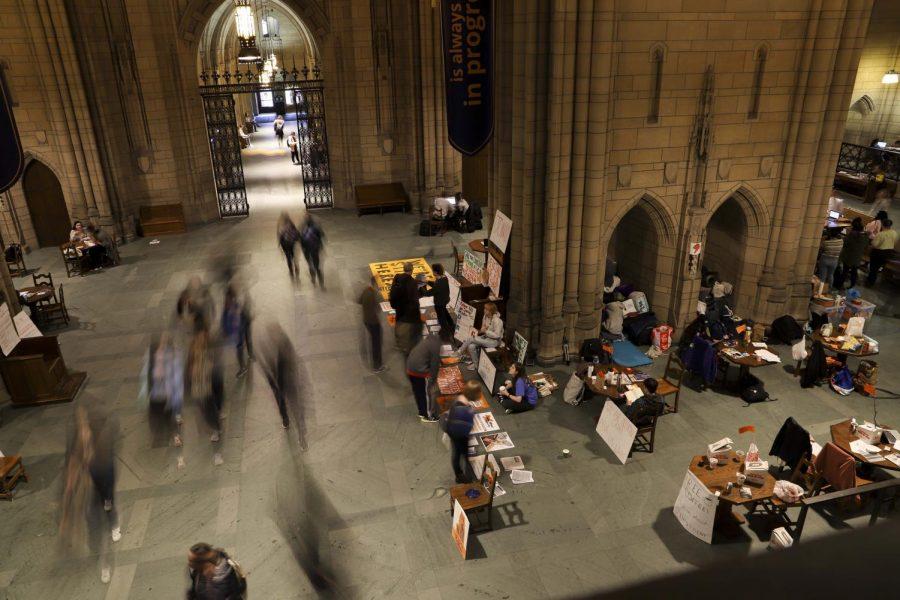Cathedral after dark: Fossil Free Pitt protest grows as Friday Board meeting approaches
Sarah Cutshall | Visual Editor
Dozens of students who are pushing Pitt to divest its endowment from fossil fuels have been staying overnight during the Fossil Free Pitt Coalition’s 24/7 occupation of the Cathedral of Learning.
February 27, 2020
Sleeping on the stone floor of the Cathedral of Learning commons room is bad, Zachary Delaney said, but it’s not as bad as you might think.
Delaney, a junior environmental studies major, has set out his yoga mat on a bench or stretch of floor of the Cathedral’s commons room before catching some z’s almost every night since Friday. He’s not alone — dozens of other students who are pushing Pitt to divest its endowment from fossil fuels have been staying overnight during the Fossil Free Pitt Coalition’s 24/7 “occupation” of the building ahead of the Friday meeting of Pitt’s Board of Trustees.
According to FFPC organizers, 25 students stayed overnight over in the Cathedral last Friday night, the first night of the occupation. That number had nearly doubled to 46 by the fifth day on Tuesday night. Abhishek Viswanathan, an organizer with FFPC and a second-year doctoral student in information science, said the growing amount of student and community support is one reason the coalition was confident about its ability to hold an effective occupation of the Cathedral.
“We have enough organizing prowess, as well as community support, to be able to escalate to the point where we can do an occupation,” Viswanathan said. “Nothing else seems to be working. We have tried everything else.”
FFPC has held a number of actions over the past few months demanding that Pitt’s Board of Trustees hold a vote on divestment from fossil fuels at its meeting this Friday. After disrupting a September Board of Trustees meeting held at the Johnstown branch campus, the coalition held a series of weekly sit-ins outside Chancellor Patrick Gallagher’s office throughout the fall semester and hosted a rally outside the Cathedral earlier this month.
While the University said the Board of Trustees will take steps related to socially responsible investing at its Friday meeting, it also confirmed it will not vote to divest. FFPC has not yet been successful in getting the Board to take this vote, an action the coalition says needs to be taken as soon as possible.
Delaney, a program associate in the Student Office of Sustainability, said he places a T-shirt over his eyes to block out the light in order to sleep. He gets a good seven hours of sleep a night, he said.
“The floors are pretty hard. They’re pretty cold. They really will suck all the heat out of your body. They’re also a little bit dirty, there’s no surprise in any of those things,” Delaney said, joking, “It’s just like home.”
During the day, the FFPC sit-in has been receiving a number of curious passersby and supporters, including politicians like State Rep. Sara Innamorato, D-21, and several members of the Allegheny County Council. At night, though, the commons room is less busy, with few visitors stopping to ask about the signs and papers laid out across the floor. Many of the protesters sit at tables marked with small felt orange flags, working quietly. Others set out Board games on the floor.
Those who are staying the night for the first time are asked to attend an information session where organizers review and explain the FFPC’s organizing principles. “Don’t do something you wouldn’t do at your parents’ house” while at the Cathedral, one organizer told students Tuesday night.
Even at 11 p.m., there’s the regular small group of non-FFPC students working on projects or papers on the other side of the commons room. Their tables aren’t marked by orange flags, but they’re aware of their fellow students protesting just a few feet away.
Evie Miller, a sophomore political science and anthropology double-major, said FFPC’s signs were eye-catching and that she found the group’s form of protest effective.
“Doing this form of peaceful protesting is a way to make your message obvious and have it be heard, but you’re not really obstructing anything,” Miller said. “This is a great space for that to happen, because they’re not really interfering with anything.”
As midnight approached on Tuesday, though, the people studying trickled out of the Cathedral and a few FFPC protesters began laying out blankets or yoga mats on the hard floor. Some stretched out under the long wooden tables of the commons room to shield their eyes, trying to block as much of the bright light as they could.
Delaney said he isn’t an organizer or one of FFPC’s most-involved members, but he participated in the group’s fall sit-ins and he’s spent almost every night at the Cathedral since the protest began. Even if his role is just to show solidarity and “fill space,” Delaney said, he feels like he’s supporting the movement.
“What brought me to this movement here was recognizing what my role is as a student and as a stakeholder in this University,” Delaney said. “I want to push as much energy as I can into things like this despite not having a specific role in their organization.”
Viswanathan compared FFPC’s occupation to the historic 1969 sit-in staged by Pitt’s nascent Black Action Society, when protesters seized control of the Cathedral’s computer center to demand better treatment for black students. The University celebrated the 50th anniversary of the BAS action last year, but Viswanathan said he found Pitt’s praise of the action hollow and hypocritical when compared to its response to FFPC.
“They spoke very eloquently about how these students recognized the injustices of their time and took bold action so that the administrators would just listen,” Viswanathan said.
“Somehow, they failed to see the parallels to today.”



